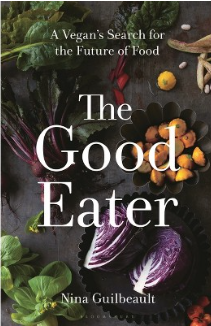Weekend reading: The Good Eater
Nina Guilbeault. The Good Eater: A Vegan’s Search for the Future of Food. Bloomsbury, 2024.

I did a back-cover blurb for this book:
The Good Eater is a vegan sociologist’s remarkably open-minded exploration of the historical, ethical, health, environmental, and social justice implications of not eating meat. Guilbeault’s extensive research and interviews get right into the tough questions about this movement, leaving us free to choose for ourselves whether to eat this way.
Guilbeault has followed vegan dietary practices (no animal products) for a long time but was troubled by the self-righteousness and proselytizing of many vegans. As a trained sociologist, she set out to investigate the origins, practices, and effects of vegan diets, through reading but also through interviews with what seems like everyone having anything to do with animal welfare and plant-forward diets. The result is an exceptionally broad look at the who’s who of veganism, from historical figures to contemporary entrepreneurs and chefs. The book is well written, rational, and not at all uncritical.
Here’s are a couple of excerpts:
Projections show that to avert environmental disaster by 2050 we need to reduce our meat consumption by at least a third, and by half in North America and Europe…But many people still eat eggs for breakfast and yogurt as a snack, put dairy milk in their coffee, add a slice of ham to their sandwich for lunch, and choose a piece of meat or fish for dinner, all in one day. A reduction from that daily menu to a couple of eggs and a small piece of meat or fish once a week seems like a hefty drop, yet that is how humanity has eaten for most of our natural history. (pp 284-285)
I can understand why, for many people, a vegan lifestyle seems unappealing, overwhelming, or even downright offensive. As we know, meat has played a key part in our cultural and evolutionary history, and habits are notoriously difficult to break. Veganism requires a shift in identity as well as the embrace of a social category still on the fringe….This is partly because being vegan in a non-vegan world is hard, but also because the vegan movement places an emphasis on moral perfection. Yet…long-lasting, sustainable change doesn’t come from a place of shame, judgment, and guilt. It comes from a place of joy and a sense of belonging. (p 290)

